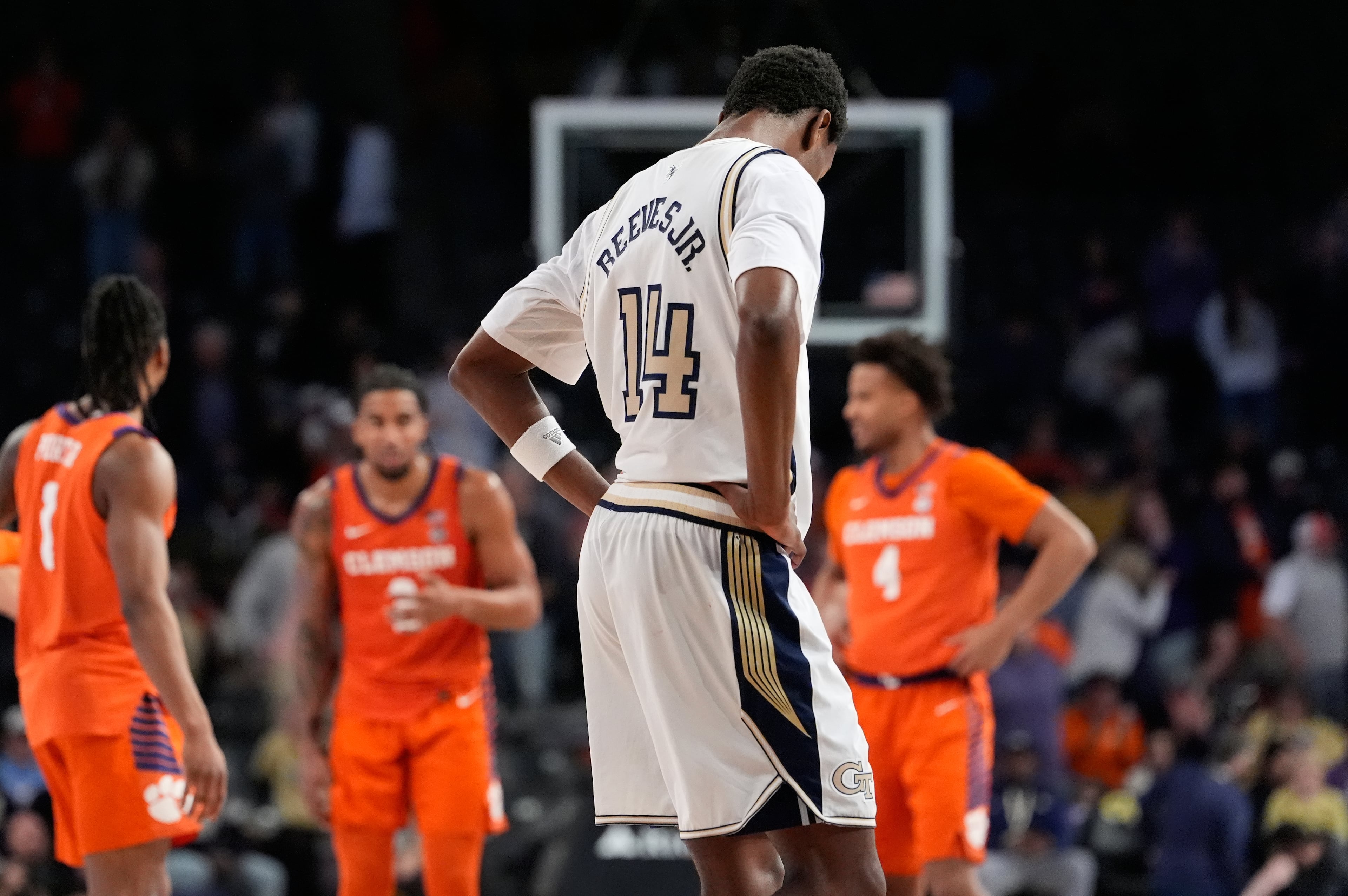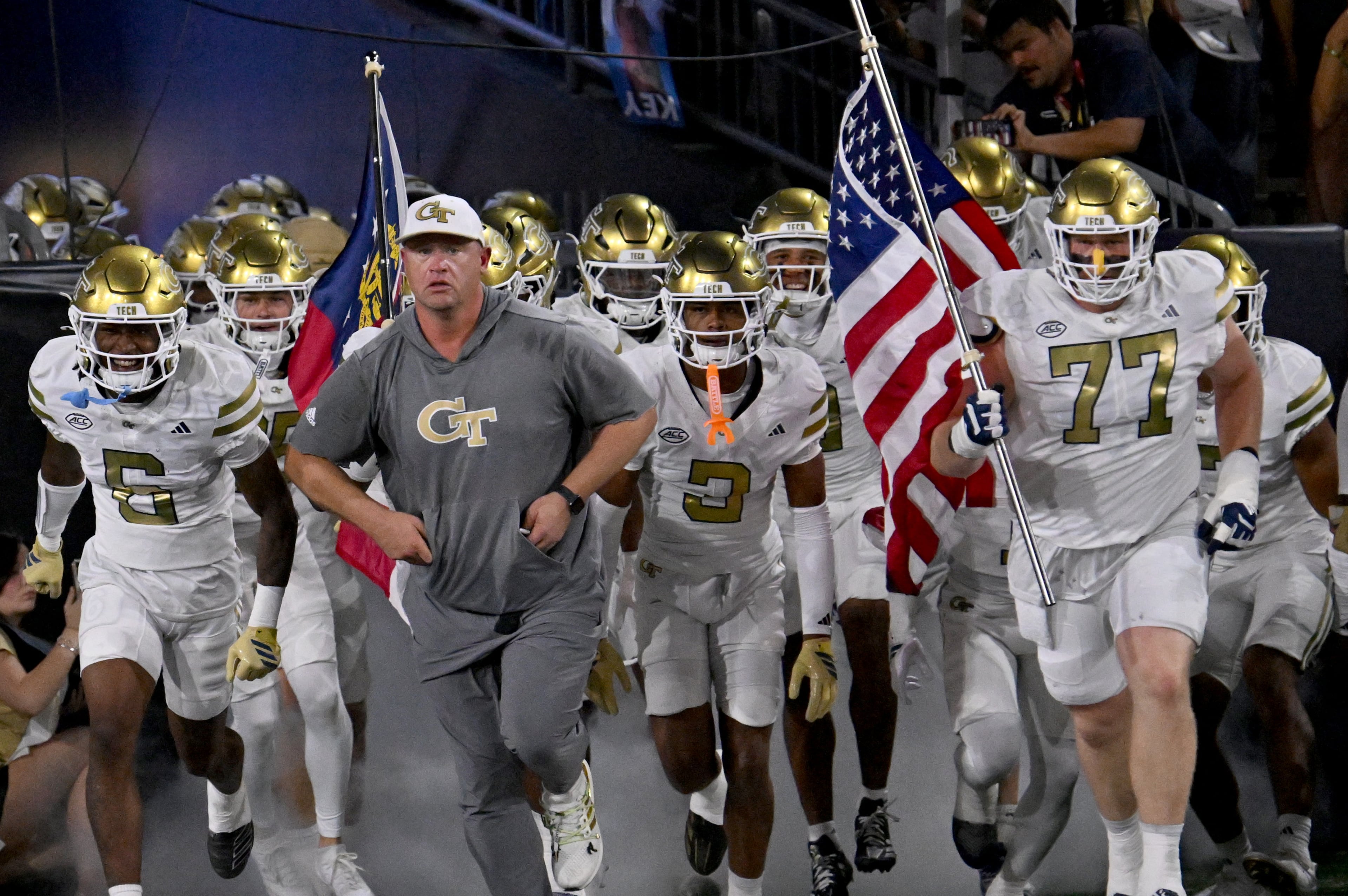5 takeaways from Georgia Tech’s loss to Miami



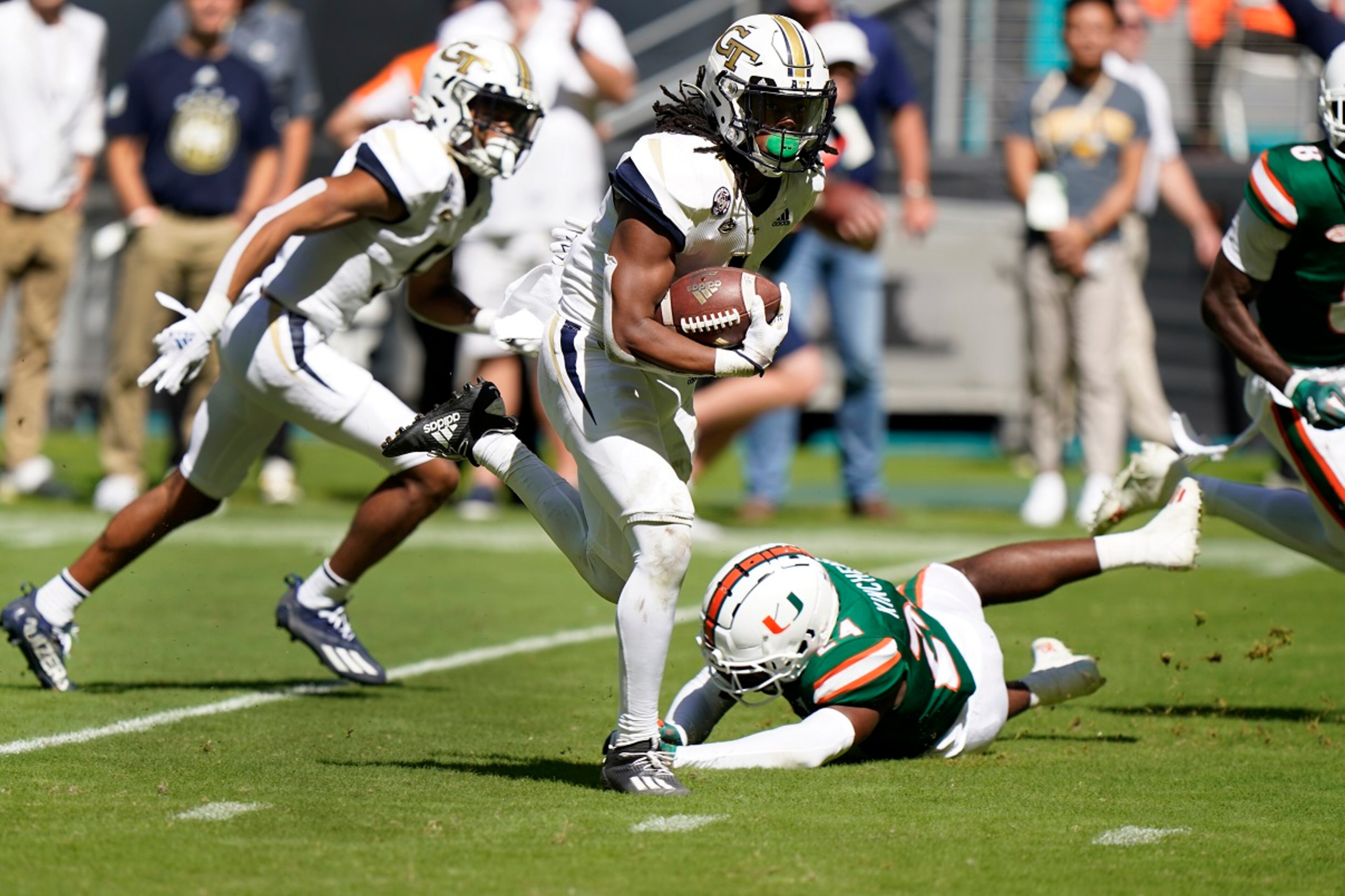




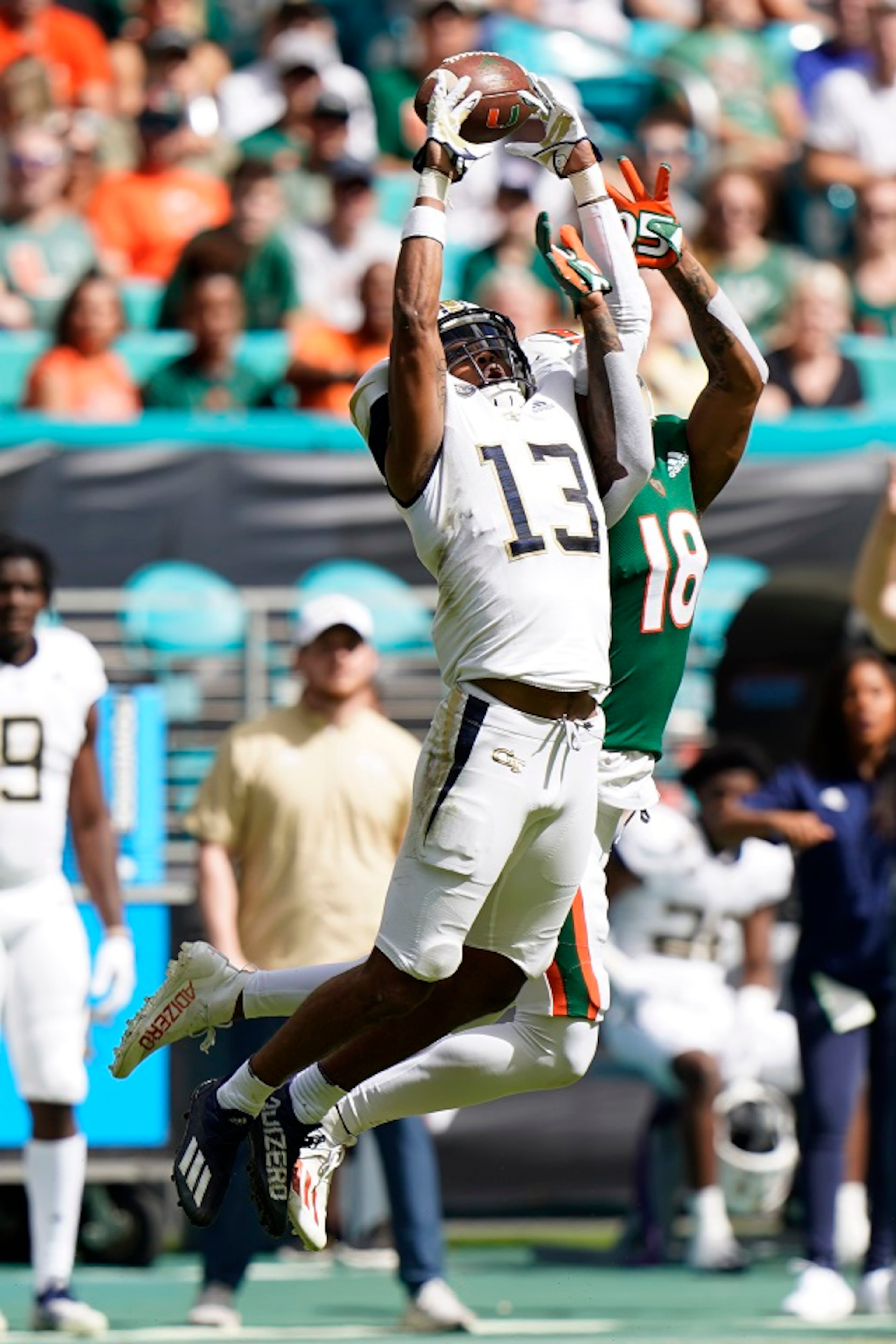
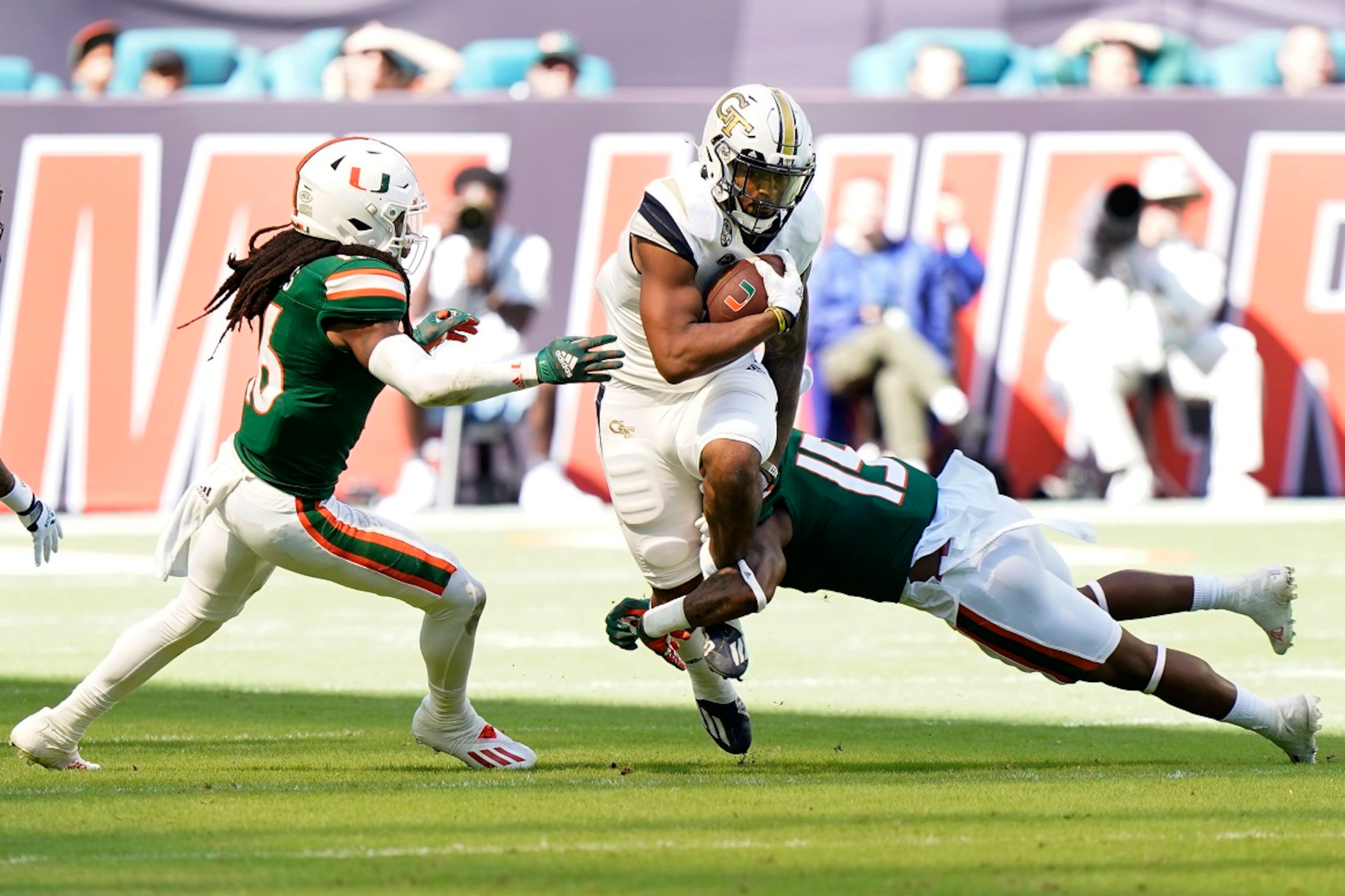





On the one hand, forcing three turnovers is an accomplishment compatible with winning games. On the other hand, getting outgained by 234 yards, as Georgia Tech was by Miami on Saturday (563-329) generally is not. Trying to break their two-game losing streak, the Yellow Jackets were denied at Hard Rock Stadium in Miami Gardens, Fla., by a 33-30 score, dropping their record to 3-6 overall and 2-5 in the ACC.
Five takeaways from the game:
1. Another superior performance by Jahmyr Gibbs
In defeat, running back Jahmyr Gibbs offered two more “wow” moments. First, his 29-yard touchdown run in the second quarter in which he sidestepped a converging defender so suddenly that the Hurricanes player lost his balance and fell to the ground.
The other was his 50-yard touchdown reception off a swing pass from quarterback Jeff Sims in the third quarter. On that play, Gibbs caught Sims’ pass in the right flat, used blocks from wide receivers PeJé Harris and Adonicas Sanders and then shifted into a gear that few on the field possessed. He cut away from safety James Williams without breaking stride, slipped through a diving tackle attempt and then kept his balance as he ran along the home sideline into the end zone.
Gibbs has ripped off 50-yard plays from scrimmage in five consecutive games – a 71-yard reception against Pitt, a 77-yard touchdown reception against Duke, a 71-yard touchdown run against Virginia, a 61-yard run against Virginia Tech and the 50-yard touchdown reception on Saturday.
It is playmaking on a monumental order. Going into Saturday’s games, only three other FBS players had amassed five plays from scrimmage of 50 yards or more in the entire season.
When Calvin Johnson (2006) and Jonathan Dwyer (2008) won ACC player of the year honors, they recorded three and six plays, respectively, of 50 yards or more.
It also doesn’t happen, obviously, without the right play call by offensive coordinator Dave Patenaude and the work of Sims, the offensive line, receivers and tight ends to get Gibbs into space to put his gifts to use.
2. Once again, close call in loss
Again, Tech did not lack for plays that could have been the difference between winning and losing. A coverage bust enabled Miami to score its second touchdown, a 35-yard completion on a third-and-12. A flea-flicker on the first play from scrimmage of the second half drew in at least two defensive backs and led to a 60-yard pass, the big play in a Hurricanes’ touchdown drive. Other plays on defense, offense and special teams could have likewise changed the Jackets’ fortunes.
Coach Geoff Collins made reference to the officiating in what could certainly be interpreted as a critique.
“There were some big plays that were called back, big explosive plays that were called back,” he said.
However, the idea that the Jackets were a play or two from winning neglects the reality that the Hurricanes were a play or two from winning by more. Where three forced fumbles were seen by the Jackets as playmaking and the fruit of training, Miami players saw them as mistakes to be corrected. Likewise, the two fourth-down stops.
“With those turnovers on offense, the game shouldn’t have even been close,” Miami quarterback Tyler Van Dyke said. “I mean, Georgia Tech’s a great defense, but we just killed ourselves with those three turnovers. Without those, we could have had a lot more points.”
3. Much of the same for defense
The defense continued to look like a forlorn unit. There were highlights – the Jackets punched out the ball from Miami ball carriers three times for three fumble recoveries. Prior to Saturday, Tech had played the previous four games without a fumble recovery, a play of primary significance for the Jackets, who aspired in the preseason to lead FBS in takeaways.
At times, the secondary made plays in pass coverage, coming up with three of the team’s four pass breakups. The Jackets had four breakups in their first five games, but now have 15 in the past four. (On the other hand, those four opponents have a combined 11/1 touchdown/interception ratio, among other markers of their overall success against the Jackets.)
The issues that have plagued the defense – ineffective pass rush, poor tackling, coverage busts – appeared to remain Saturday. Often, an inability to pressure Van Dyke led to wide receivers getting time to get open downfield. The Hurricanes’ 11.4 yards-per-attempt average was their season high against an FBS opponent, and also a season high for the Jackets defense. Whatever gains were made against the Hurricanes, defensive back Jaylon King credited improved trust within the unit.
“I know there’s been issues where we’ll put blame on linebackers, D-line, DB’s,” he said. “So throughout this past week we kind of just put that aside and said we’re going to play as one unit, so I felt like that helped us this week.”
4. Tough day for Sims
Not at his best, Sims missed on several passes that could have extended drives to lead to scores or at least keep the defense off the field and help flip field position. The Jackets lost the average starting field-position battle to Miami by 10 yards, a significant margin. In Collins’ tenure, Tech is 3-20 when its average starting field position is worse than its opponents’ and 6-2 when it’s better.
Sims was 21-for-38 for 194 yards with a touchdown and an interception. Excluding the Northern Illinois game, which he left with an injury after throwing only nine passes, his 5.1 yards-per-attempt average was the lowest of his career. That rate was also the season low for Miami against FBS opponents. In Tech’s four previous games, he averaged 8.9 yards per attempt with a 10/6 touchdown/interception ratio.
“It was just a little mishaps on the throws, but Jeff’s going to get it right,” Gibbs said. “He’ll bounce back next game. I believe in him.”
Backup Jordan Yates was not apparently not an option to perhaps let Sims sit out a series, as he was banged up and coaches were hoping to avoid having to play him, according to a person familiar with the situation.
Miami 33, Georgia Tech 30
5. Questions mount
In a rarity, Collins pushed back on the line of questioning at his post-game news conference. At two points during the session, in response to questions about the team’s continued inability to win close games and the Jackets’ difficulty in stopping Miami running back Jaylan Knighton, Collins’ responses included his observations that “we want to harp on the things that went wrong” and that “we don’t seem to want to talk about” various highlights for the Jackets in the game, including two stops of Miami on fourth-and-1. (The interludes aside, he did address the substance of both questions.)
Perhaps more than anything, it likely was a reflection of Collins’ belief that his team is indeed close to winning these close games that his teams are in (although they have lost most of them). And perhaps that anyone who watches the team should be able to see it also.
“Anybody that sees where we were two years ago to where we are today, you should be able to see it, you should be able to feel it,” Collins said this past week.
The ship may turn around yet. But Collins, a resolutely optimistic person charged with leading a reversal that has gone slower than most Tech fans would have hoped, will face questions until it happens.

